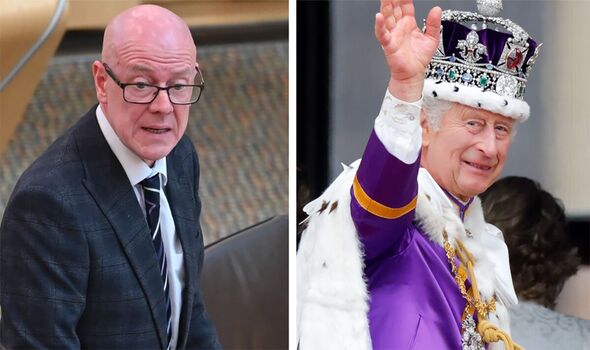Politics
SNP MP Proposes Dropping Oath to King Charles in Scotland

A bid to eliminate the oath of allegiance to King Charles III in the Scottish Parliament has ignited controversy, prompting accusations of political opportunism. Kevin Stewart, a Member of the Scottish Parliament (MSP) for the Scottish National Party (SNP), initiated this proposal following Grenada’s recent decision to remove a similar oath from their national Parliament.
In a post on social media platform X, Stewart stated, “Grenada has decided to drop the oath of allegiance to the King, isn’t it time that Scotland followed their lead?” He has formally lodged a motion in the Parliament advocating for a shift in allegiance from the British crown to the people of Scotland. The motion asserts: “That the Parliament commends Grenada’s reported decision to drop the oath of allegiance to the British crown and replace it with a pledge of allegiance to Grenada; recognises that the people of Scotland are sovereign, and believes that Scotland’s Parliament should have the power to follow Grenada’s lead and have its members pledge allegiance to the people of Scotland and not an unelected monarch.”
Under the Scotland Act 1998, all Members of the Scottish Parliament are required to take an oath of allegiance or make a solemn affirmation before they can participate in parliamentary proceedings. Stewart’s motion has prompted a mixed response from fellow politicians, particularly from the opposition.
Scottish Conservative MSP Murdo Fraser criticized Stewart’s proposal, describing it as “shameless” and an attempt to appeal to republican sentiments among voters. Speaking to GB News, Fraser remarked, “The reality is that the King and the monarchy remain one of the most loved and respected institutions across Scotland.” He further expressed concern that nationalist MSPs are prioritizing constitutional debates instead of addressing pressing issues facing the Scottish populace, such as improving NHS waiting times, stimulating economic growth, and enhancing educational standards.
If Stewart’s motion garners sufficient support, it will be eligible for debate in the Scottish Parliament. Nevertheless, any vote passed would not possess the authority to amend existing laws regarding the oath of allegiance.
The ongoing debate highlights the diverse opinions within Scotland regarding the monarchy and the role of allegiance in modern governance. As discussions unfold, the implications of Stewart’s proposal could reverberate beyond the Parliament, reflecting broader sentiments about national identity and sovereignty within Scotland.
-

 Entertainment3 months ago
Entertainment3 months agoAnn Ming Reflects on ITV’s ‘I Fought the Law’ Drama
-

 Entertainment4 months ago
Entertainment4 months agoKate Garraway Sells £2 Million Home Amid Financial Struggles
-

 Health3 months ago
Health3 months agoKatie Price Faces New Health Concerns After Cancer Symptoms Resurface
-

 Entertainment3 months ago
Entertainment3 months agoCoronation Street’s Carl Webster Faces Trouble with New Affairs
-

 Entertainment3 months ago
Entertainment3 months agoWhere is Tinder Swindler Simon Leviev? Latest Updates Revealed
-

 World2 weeks ago
World2 weeks agoBailey Announces Heartbreaking Split from Rebecca After Reunion
-

 Entertainment4 months ago
Entertainment4 months agoMarkiplier Addresses AI Controversy During Livestream Response
-

 Entertainment2 weeks ago
Entertainment2 weeks agoCoronation Street Fans React as Todd Faces Heartbreaking Choice
-

 Science1 month ago
Science1 month agoBrian Cox Addresses Claims of Alien Probe in 3I/ATLAS Discovery
-

 Health4 months ago
Health4 months agoCarol Vorderman Reflects on Health Scare and Family Support
-

 Entertainment4 months ago
Entertainment4 months agoKim Cattrall Posts Cryptic Message After HBO’s Sequel Cancellation
-

 Entertainment3 months ago
Entertainment3 months agoOlivia Attwood Opens Up About Fallout with Former Best Friend





















